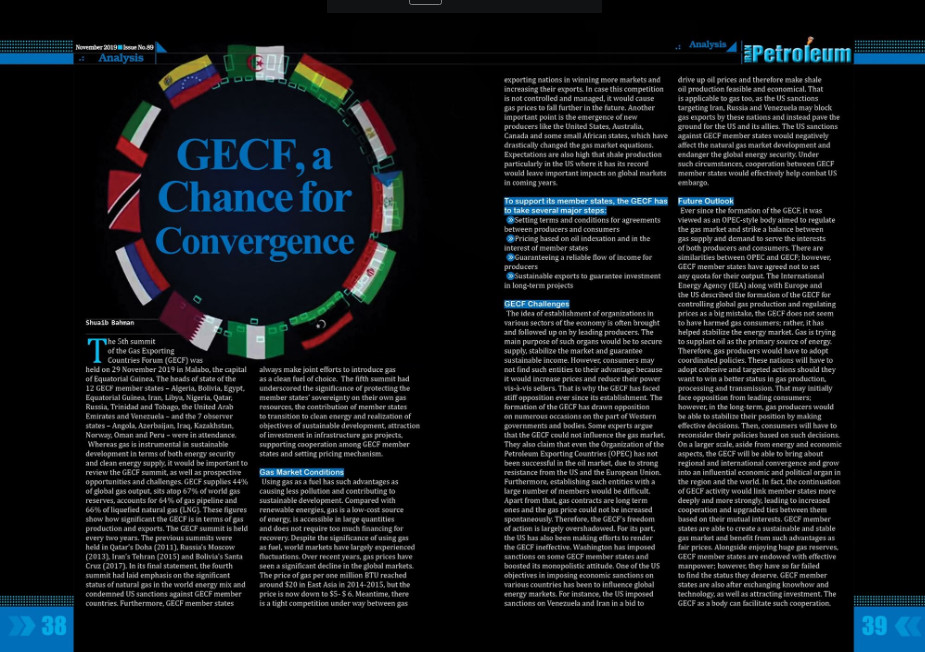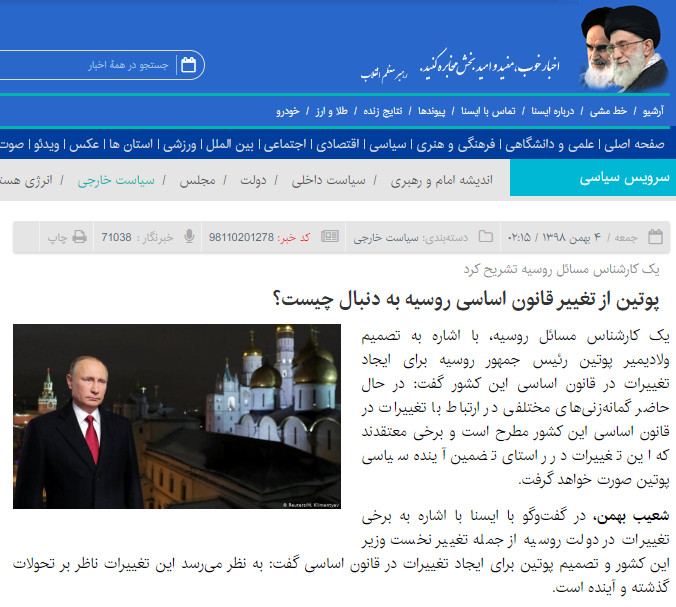Dr. Shuaib Bahman
The 5th summit of the Gas Exporting Countries Forum (GECF) was held on 29 November 2019 in Malabo, the capital of Equatorial Guinea. The heads of state of the 12 GECF member states – Algeria, Bolivia, Egypt, Equatorial Guinea, Iran, Libya, Nigeria, Qatar, Russia, Trinidad and Tobago, the United Arab Emirates and Venezuela – and the 7 observer states – Angola, Azerbaijan, Iraq, Kazakhstan, Norway, Oman and Peru – were in attendance.
Whereas gas is instrumental in sustainable development in terms of both energy security and clean energy supply, it would be important to review the GECF summit, as well as prospective opportunities and challenges.
GECF supplies 44% of global gas output, sits atop 67% of world gas reserves, accounts for 64% of gas pipeline and 66% of liquefied natural gas (LNG). These figures show how significant the GECF is in terms of gas production and exports.
The GECF summit is held every two years. The previous summits were held in Qatar’s Doha (2011), Russia’s Moscow (2013), Iran’s Tehran (2015) and Bolivia’s Santa Cruz (2017).
In its final statement, the fourth summit had laid emphasis on the significant status of natural gas in the world energy mix and condemned US sanctions against GECF member countries. Furthermore, GECF member states always make joint efforts to introduce gas as a clean fuel of choice.
The fifth summit had underscored the significance of protecting the member states’ sovereignty on their own gas resources, the contribution of member states to transition to clean energy and realization of objectives of sustainable development, attraction of investment in infrastructure gas projects, supporting cooperation among GECF member states and setting pricing mechanism.
Gas Market Conditions
Using gas as a fuel has such advantages as causing less pollution and contributing to sustainable development. Compared with renewable energies, gas is a low-cost source of energy, is accessible in large quantities and does not require too much financing for recovery. Despite the significance of using gas as fuel, world markets have largely experienced fluctuations. Over recent years, gas prices have seen a significant decline in the global markets. The price of gas per one million BTU reached around $20 in East Asia in 2014-2015, but the price is now down to $5- $ 6.
Meantime, there is a tight competition under way between gas exporting nations in winning more markets and increasing their exports. In case this competition is not controlled and managed, it would cause gas prices to fall further in the future. Another important point is the emergence of new producers like the United States, Australia, Canada and some small African states, which have drastically changed the gas market equations.
Expectations are also high that shale production particularly in the US where it has its record would leave important impacts on global markets in coming years.
To support its member states, the GECF has to take several major steps:
Setting terms and conditions for agreements between producers and consumers
Pricing based on oil indexation and in the interest of member states
Guaranteeing a reliable flow of income for producers
Sustainable exports to guarantee investment in long-term projects
GECF Challenges
The idea of establishment of organizations in various sectors of the economy is often brought and followed up on by leading producers. The main purpose of such organs would be to secure supply, stabilize the market and guarantee sustainable income. However, consumers may not find such entities to their advantage because it would increase prices and reduce their power vis-à-vis sellers. That is why the GECF has faced stiff opposition ever since its establishment. The formation of the GECF has drawn opposition on numerous occasions on the part of Western governments and bodies.
Some experts argue that the GECF could not influence the gas market. They also claim that even the Organization of the Petroleum Exporting Countries (OPEC) has not been successful in the oil market, due to strong resistance from the US and the European Union. Furthermore, establishing such entities with a large number of members would be difficult. Apart from that, gas contracts are long term ones and the gas price could not be increased spontaneously. Therefore, the GECF’s freedom of action is largely overshadowed.
For its part, the US has also been making efforts to render the GECF ineffective. Washington has imposed sanctions on some GECF member states and boosted its monopolistic attitude. One of the US objectives in imposing economic sanctions on various countries has been to influence global energy markets. For instance, the US imposed sanctions on Venezuela and Iran in a bid to drive up oil prices and therefore make shale oil production feasible and economical. That is applicable to gas too, as the US sanctions targeting Iran, Russia and Venezuela may block gas exports by these nations and instead pave the ground for the US and its allies.
The US sanctions against GECF member states would negatively affect the natural gas market development and endanger the global energy security. Under such circumstances, cooperation between GECF member states would effectively help combat US embargo.
Future Outlook
Ever since the formation of the GECF, it was viewed as an OPEC-style body aimed to regulate the gas market and strike a balance between gas supply and demand to serve the interests of both producers and consumers. There are similarities between OPEC and GECF; however, GECF member states have agreed not to set any quota for their output.
The International Energy Agency (IEA) along with Europe and the US described the formation of the GECF for controlling global gas production and regulating prices as a big mistake, the GECF does not seem to have harmed gas consumers; rather, it has helped stabilize the energy market.
Gas is trying to supplant oil as the primary source of energy. Therefore, gas producers would have to adopt coordinated policies. These nations will have to adopt cohesive and targeted actions should they want to win a better status in gas production, processing and transmission. That may initially face opposition from leading consumers; however, in the long-term, gas producers would be able to stabilize their position by making effective decisions. Then, consumers will have to reconsider their policies based on such decisions.
On a larger scale, aside from energy and economic aspects, the GECF will be able to bring about regional and international convergence and grow into an influential economic and political organ in the region and the world.
In fact, the continuation of GECF activity would link member states more deeply and more strongly, leading to increased cooperation and upgraded ties between them based on their mutual interests.
GECF member states are able to create a sustainable and stable gas market and benefit from such advantages as fair prices. Alongside enjoying huge gas reserves, GECF member states are endowed with effective manpower; however, they have so far failed to find the status they deserve. GECF member states are also after exchanging knowhow and technology, as well as attracting investment. The GECF as a body can facilitate such cooperation.








